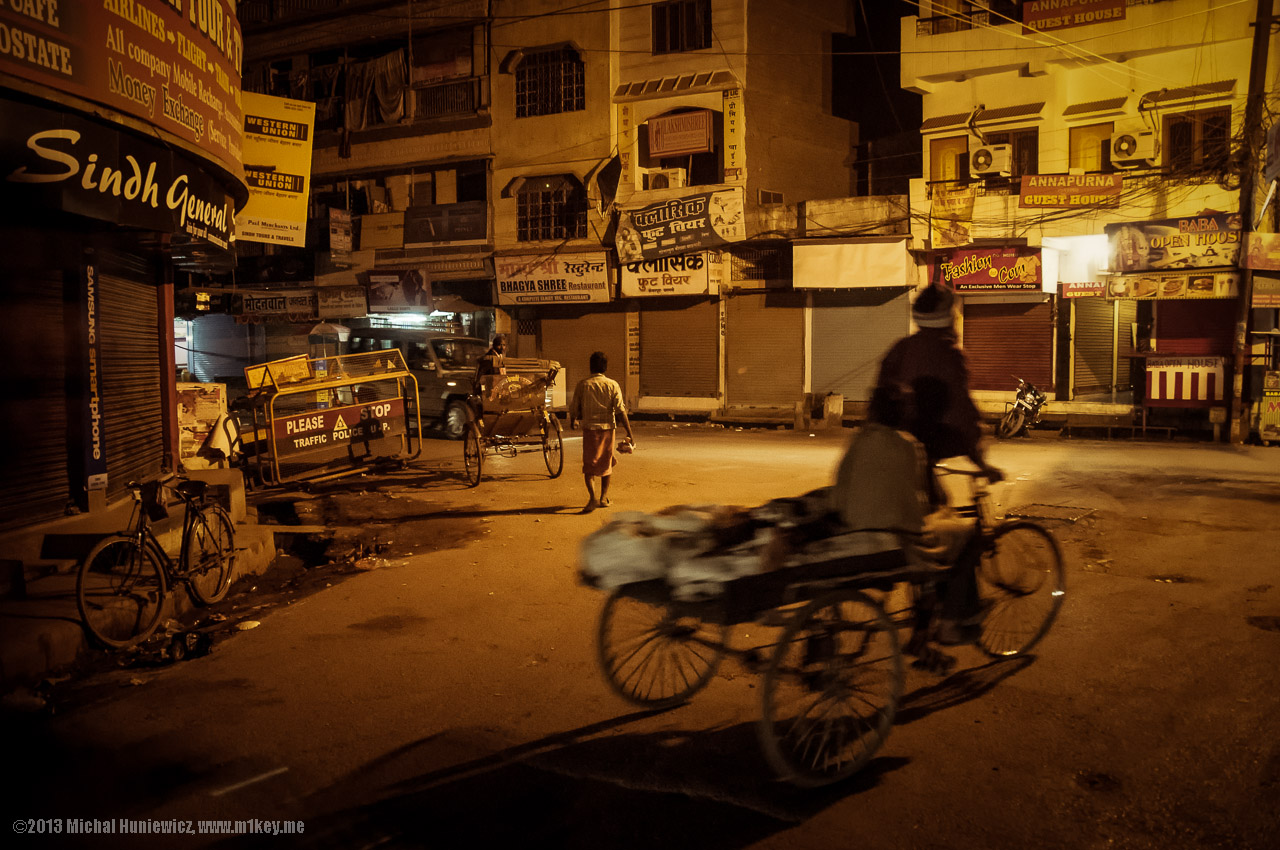Sometimes on weekend mornings I wake up and find myself lazily fascinated by the image of my partner's sleeping form. The innocence of resting lips curved into a dreaming smile, mussed hair and arms drawn close.
The night of the election, after CNN had all but called it, I trudged to bed still half-unable to believe or accept it. Neither of us could sleep. When I thought about the election and looked into his gentle eyes I felt two emotions intermingle painfully--a rush of dread and fear, a Will you be safe?
I felt the visceral desire to hold him close, as if my arms and that room's four walls could be permanent guarantors of safety. I have never felt this pit in my stomach before. That has been my privilege. The parents who have told their black sons in decades past to step off the sidewalk and never look a white woman in the eye, the parents who still have to have conversations with their children about racialized police brutality today--this has been a feeling they have known for so long. The feeling of looking at a person you love and feeling the seesaw in the soul: simultaneous delight in their beauty and innocent hope, next to the frustration and impotence you feel knowing that you alone can't keep them safe.
I felt this sense of fear for him more than me because even though Vincent Chin was brutally murdered for the color of his skin in 1982 Detroit (NYTimes), I know, deep down, that I--the 5'2" half-Asian female--am not constructed as "the threat" here, at least not in the same way that he is as a brown man.
Yet my fear wasn't something I voiced out loud. I told myself I was being irrational, and eventually, sleep came. Then I woke up and saw that this election has already emboldened people to lash out at those they see as Other. You can take a look at some of the things that folks are posting about on reporter Shaun King's Facebook page.
Particularly in the wake of post-election hate crimes, I feel mystified by the decisions of people I know--the parents of dear Asian-American friends from the seemingly liberal hotbed of the greater Seattle area--who voted for Trump. Not out of any affinity for the KKK, but because social or economic reasons outweighed concerns about his temperament or inflammatory rhetoric toward Americans of many identities.
What confuses me is the logic behind that weighing.
After all, money can only insulate you and protect you up to a point. Flying first-class doesn't mean skipping a TSA security line where religious garments or the color of your skin make you a suspect. Kunal Nayyar (the guy who acts Raj Koothrappali on the Big Bang Theory) tweeted "Well if you look like me - you'd better start shaving your beard every day." Just because you're the member of a "model minority" doesn't mean that people won't yell at you to "Go back to China!" in the middle of a crowded New York City street.
In the wake of hatred and divisiveness post-election, I saw on Facebook that there are folks making uplifting videos with the hashtag #MyAmericaIs. I whole-heartedly support the idea, but I have to admit that my first thought was not a generous one.
It was this: my America is also the America whose scientists deliberately infected Guatemalans with syphilis (without any semblance of informed consent) in a clinical trial perhaps worse than that conducted in Tuskegee (NYTimes).
My America is the America that backed the overthrow of democratically elected Salvador Allende in Chile, and subsequent dictatorship of Pinochet (The Guardian). And then there's what we do at home: my America is the America that disenfranchises people of color, then turns around and fails to teach it comprehensively in our history books (e.g., the moves made by conservative Texas school board members--Dallas News).
Certainly my America is beautiful, too--like the Big Sky country of Montana that I fell in love with as a kid on a road trip to Yellowstone--but reading a book like Missoula, Jon Krakauer's searing book on that town's acceptance of rape culture and prioritization of college football over women's welfare and justice (NYTimes), brings some clouds to that big sky.
We don't get the luxury of picking and choosing which Americas are "ours" if that means selectively ignoring the narratives that make us feel sad. Ashamed. Complicit. Repentant.
We have to see our country for what it is and what it has been if we want to make good decisions on what it will be. And in fairness, our education system hasn't necessarily done the best job of giving all Americans the opportunity to study a complicated history of the US. A US history that problematizes pilgrim dioramas and lends nuance to our "victories."
Still, I clung to some semblance of faith on Election Day. Maybe I just imagined that more people, like me, would put their faith in her.
At the risk of sounding hagiographic, I've looked up to Hillary Clinton since I was ten years old. (I've written about it in an older blog post.) I'd like to think that my admiration became more nuanced recently. After all, when I was ten, I didn't have too many friends who were forwarding me thinkpieces about HRC as a bastion of neoliberalism or cunning engineer of DNC intrigues or, well, straight-up evil.
I read them all.
But here's the thing: I rarely hear people saying they voted one way or another because of reading a lot of thinkpieces. Instead, people get excited to vote for the person you'd "get a beer" with. Clinton hasn't ever been perceived as charismatic in the same way that Bill Clinton or Barack Obama were. It said something to me about the profound difficulty of striking the right balance with voters as a female politician: being energetic, but not too energetic lest you be "hysterical," and being steely, but not too steely, lest you be "bossy," or worse, "bitchy."
My admiration for Secretary Clinton persisted because of an appreciation for imperfection in a female role model. Tavi Gevinson, the founder of Rookie, said it best in her TEDxTeen talk: "What makes a strong female character is a character who has weaknesses, who has flaws, who is maybe not immediately likable, but eventually relatable."
For a lot of people, Clinton's relatable moment was when she shed tears in New Hampshire in 2008. For me, it was when I read some excerpts from her letters to a friend during her Wellesley days and I saw something of my own 19-year-old angst--NYTimes described her writing as "by turns angst-ridden and prosaic, glib and brooding, anguished and ebullient." The excerpts are worth reading (here). That was the moment I found Secretary Clinton relatable. I wish that more of America had had that moment.
At the same time, it's relatability, and a sort of personal identification with the candidate or party, that makes the outcome hurt more.
I'm reminded of a time I walked past some Berkeley guys waiting for a bus and they were talking in loud, jocular terms about people "being pussies."
I'd heard people toss the phrase around before, but for some reason that was the first moment that it clicked. Instead of "pussies" just being some abstract slur I thought to myself, "I have one."
And then, the question that entered my head, as it now always does, was a simple one: "Why do they hate us?"
That was 3 guys. It was easier to brush off. But now it's 59 million people, men and women both, and it hurts. It hurts when I think of kids sleeping tonight who wake up and go into a world where shit like this happens. It's selfish, but it hurts when I think back to my kid self too, so full of hope in a Clinton rally in Seattle in '08.
At that time, I was more politically active than I am now. I watched the news every night, and made low-resolution YouTube videos where I railed against George W. Bush (especially on education policy) and did a very, very bad impersonation of Sarah Palin. (Really. Don't go looking for it.)
I know that I've lost some--well, a lot--of that zealotry; it's been tempered into something a little more reticent. With this election over, I have wondered if I should feel more guilty for that reticence. For not supporting Hillary Clinton more vocally. In reflecting, though, I realize that I've never been sure of how much preaching to the choir can do.
So in the end, it's 4AM and I'm sitting on the floor in my bedroom because, like last night, I can't sleep. But I made it to my classes today, and there's a "Love Trumps Hate" shirt (purchased from the HRC website) on my chair. Wearing it may not feel un-ironic for a long time, but I'll wear it tomorrow to go running. It'll be an aspirational thing. (Plus, that shirt is way too soft--and expensive--to never wear again.)
I'll go to a Chinese class that I share with a room full of the smart and striving and funny children of immigrants, and an International and Area Studies class called "Cultures and Capitalisms." Maybe in class I'll feel that lurking feeling of frustration, of impotence, as we discuss scholars whose names may never touch the lips of many of the people who voted for Trump. As we have lofty conversations about capitalism I'll wonder if all of us with our raised hands are preaching to the choir.
But then I remember, because 4AM is the hour of random things connecting in the brain, something we discussed in another theory-heavy class--my English class ("Postcolonial Sex"--a quintessential Berkeley class if you ever heard one). There we discussed the formation of nations as imagined communities, and how nations are prominently gendered and oftentimes figured as female--i.e., the "motherland."
I bring this up because of all the people who equated the Trump victory to America going down in flames (there was even some spoof video on Facebook circulating titled "Live Electoral Map" that just superimposed an American perimeter on a video of logs burning).
I dearly hope that a Trump presidency will not be a realization of that image.
But if it is, maybe this is the only silver lining of our strange gendering of nations as female: it is women, all the stories tell us, from Sita to Daenarys, who walk through fire the best. And emerging, at the end, unbowed. Unbroken.
Till then, no matter who you voted for, hold each other close.










